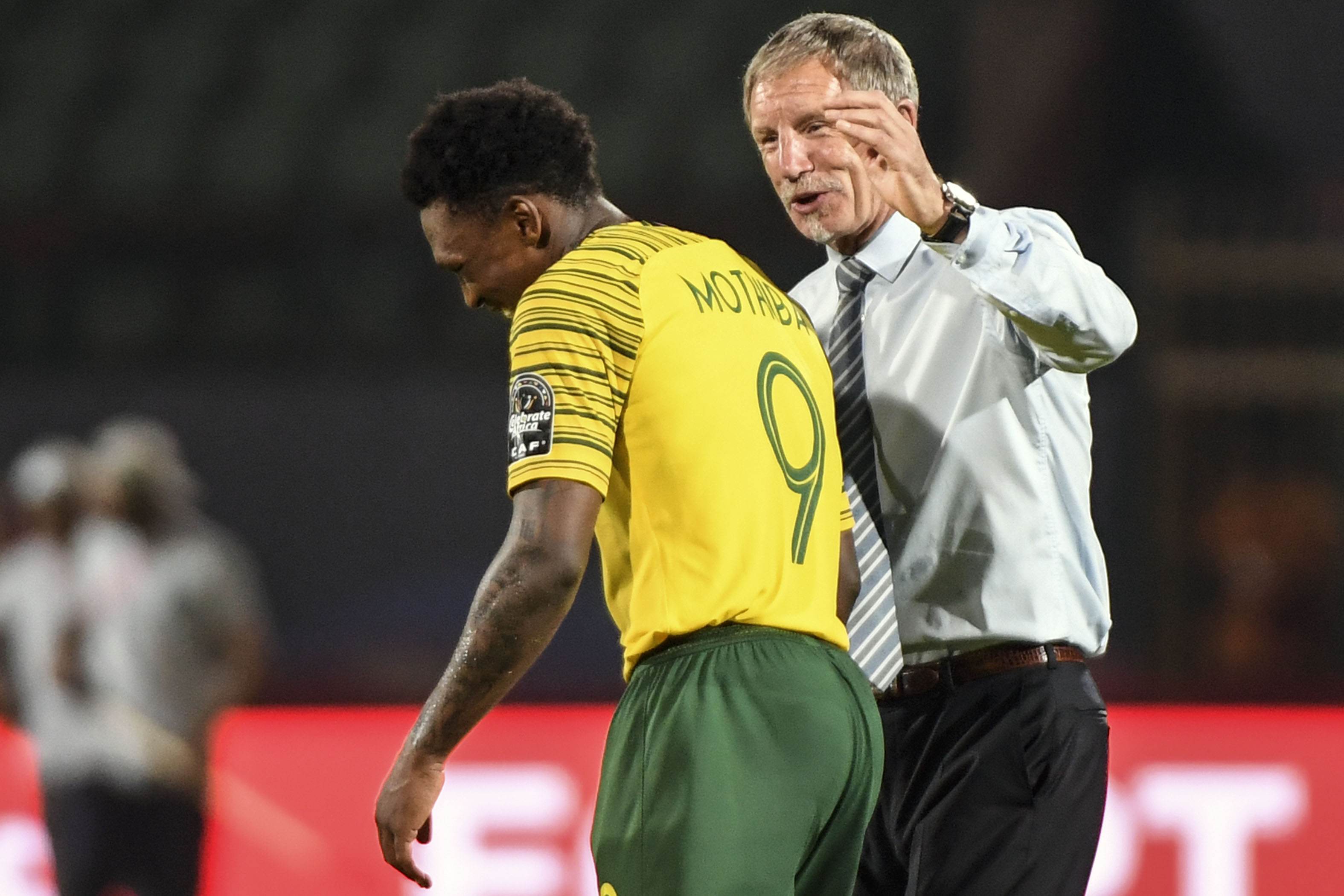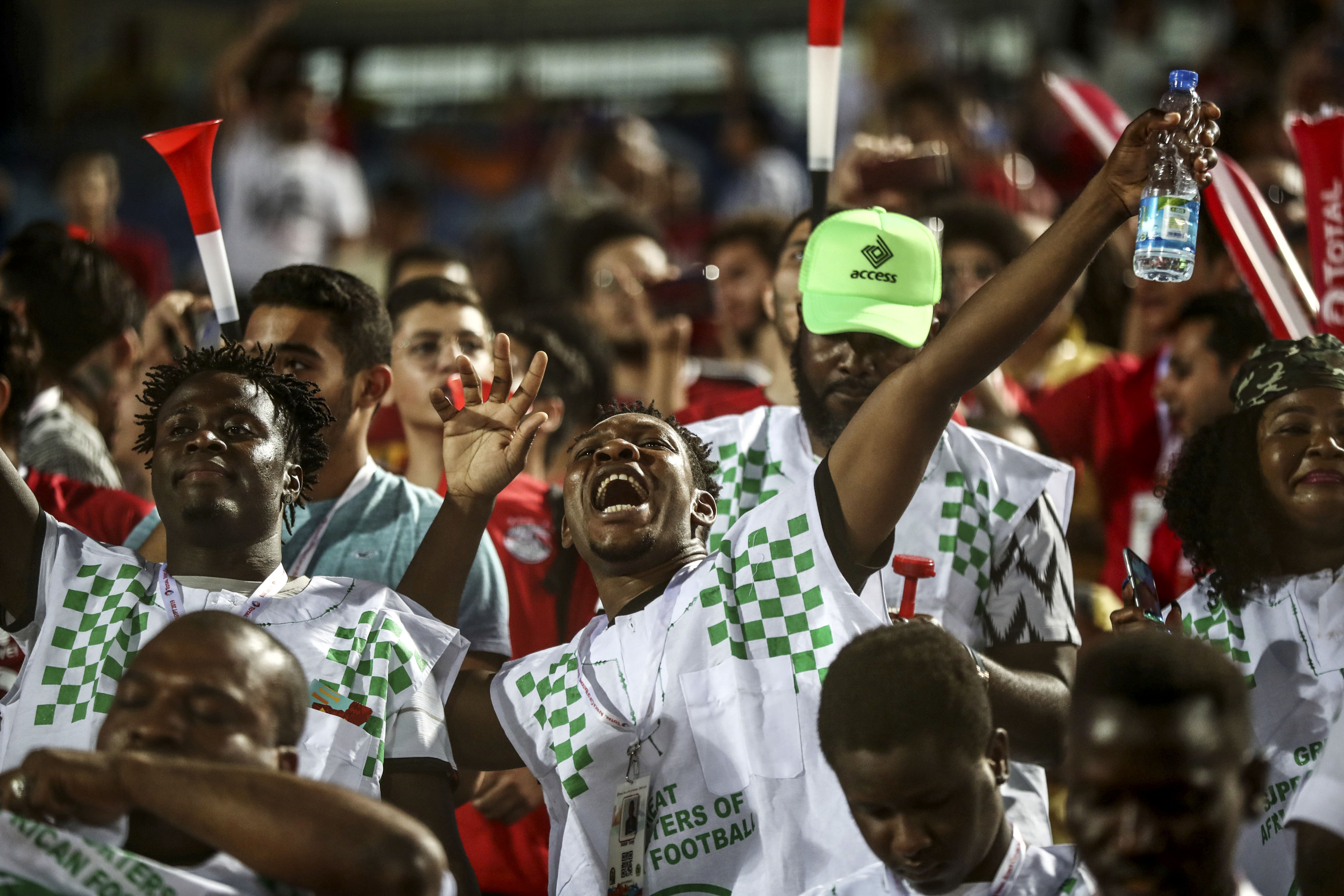Succession planning: Bafana forward Percy Tau is South Africas best player, and he could get even better, while (Javier Soriano/Khaled Desouki/AFP)
The legacy of Bafana Bafana at Afcon 2019 is complicated.
On the one hand, the on-pitch evidence is far from compelling: three losses out of five games is an accurate reflection of what inconsistent football buys you. It’s just not enough to procure positive outcomes against a West or North African powerhouse when they have their tails up.
But as they never really do, results don’t tell the full story.
“Bafana Bafana” was on everybody’s lips in Cairo in the days between their dismantling of hosts Egypt and the quarterfinal loss to Nigeria. Some locals even promised to support the team that had eliminated them — if you’re going to lose, it’s always nice to do so to the eventual winners, the cliché goes.
Come game day it was clear that those who had made that claim were either heavily in the minority or were telling fibs to peddle their goods.
Almost everyone in the Cairo International Stadium was anti-South Africa on that dry, hot evening. A small contingent decked out in yellow aside, no one wanted to see South Africa enjoy a first trip to the semifinals since the turn of the millennium.
Although Nigeria’s actual fan base was far bigger, it was the locals that really swung the atmosphere. Clearly suffering from a nasty case of bitterness, they took the time to loudly boo every player’s name as the starting line-up and then the substitute list was read out — from No 2 Buhle Mkhwanazi to No 22 Lars Veldwijk.
The animosity was palpable.
And it was beautiful.
This is who we want to be. Troublemakers, disrupters, antagonisers. South Africa visited an historic land with a population of 100-million and left a mark. That’s doubly significant when you consider it’s the home of the most decorated team in the Africa Cup of Nations.
Any team or player that is universally liked is probably not very good at football. Being proficient at this job means routinely forcing heartache and tears out of millions of people who were foolish enough to back the team standing on the other side of the pitch.
Watching the annoyance Bafana generated was a wonderful thing to be a part of.
But, the high can only last so long and we came down in a hard way against Nigeria.
What happens next is unclear and the next few steps will probably be a lot less fun than this experience.
First on the agenda? Working out what fate coach Stuart Baxter has earned himself — assuming he will not be stepping down of his own will. In the post-game press conference at least, the Scot spoke of Bafana Bafana as a long-term project to which he’s fully committed.
 Youngster Lebo Mothiba (left) potentially has a long career ahead of him. Coach Stuart Baxter’s future is a question mark right now. (Javier Soriano/Khaled Desouki/AFP)
Youngster Lebo Mothiba (left) potentially has a long career ahead of him. Coach Stuart Baxter’s future is a question mark right now. (Javier Soriano/Khaled Desouki/AFP)
“I think it’s been a difficult journey because as a coach, if you make changes, sometimes that’s very popular,” he reflected. “You bring in some young players, that’s very popular, but you lose games, and you don’t live very long. So the journey has been difficult, but we didn’t lose a game for one and a half years.
“During that process it was good and we came to this tournament really to try to give this team a major tournament that they haven’t had, because we haven’t qualified for Afcon for quite a while. So I’m sure that the experience will do the players good. But we have to learn, you know. It’s not a question of just experiencing it. You have to learn and adjust and be better. So we need to be better.” If there’s one unchanged criticism of Baxter’s second tenure as coach, it’s that he’s often been too rigid and stubborn in his selection choices. The good news is that there’s now an incredible scope for change and improvement that either he or a successor could explore.
The forward line is theoretically only going to get better. Given the responsibility that’s been heaped on the shoulders of Lebo Mothiba, it’s easy to forget he’s only 23 years old. With the right guidance, the target man with his shirt perpetually tucked in could be bossing opposition defences for years to come.
Thembinkosi Lorch will begin next month’s Premier Soccer League campaign determined to prove that the excellence of last season is something he can maintain. He was regrettably marked out of the game by the Nigerians and starved of service, but it’s lonely nights like those that build a player’s character. We can only hope it’s the beginning of his personal international journey.
On the opposite flank, Percy Tau is already Bafana’s best player. Now approaching what should be his prime, there’s a chance he may grow even deadlier.
The rest of the international contingent bring much experience to the table but are young enough to hang around for a while yet. Kamohelo Mokotjo, Bongani Zungu, Thulani Serero and Keagan Dolly (should he shake his injury plague) have the potential to form much of the fulcrum of future sides.
 Victors: Nigerian supporters outnumbered South Africa’s at the Afcon quarterfinal, and their team soared to victory with a 2-1 win. (Sumaya Hisham/Reuters)
Victors: Nigerian supporters outnumbered South Africa’s at the Afcon quarterfinal, and their team soared to victory with a 2-1 win. (Sumaya Hisham/Reuters)
Then there are those who will surely find extended opportunities to impress soon enough and potentially bring much-needed creativity to the set-up. Maritzburg United alumni duo Lebogang Maboe and Siphesihle Ndlovu immediately come to mind.
In short, more significant players will soon be coming in. The talent is there.
“It’s not only talking about Bafana Bafana as a team,” Baxter would later continue philosophically. “You’re talking about individual players, to remote experiences playing abroad. We’re talking about the youth development of the country. You talk about talent identification, coach education.
“And so we have some very good plans in South Africa, but the word ‘implementation’ needs to be stronger. I think if we can follow that, and continue the development programme, then I think Bafana will gain from that. And I think it needs support. It needs supporting. You know, the players, the environment that they play in, is very important. So we all need to support that. Any strategies that we have to develop football all need to be supported by everybody.”
Supporting Bafana and the system surrounding the team is easier when we know we’re a factor. For the first time in a while we got to taste relevance in Egypt. We’ll find out what will become of Baxter in a few days, but no matter who’s in charge, it’s vital that none of us, from the fans to the players, forget what this feeling tastes like.
Luke Feltham travelled to Cairo courtesy of Gilead Sciences